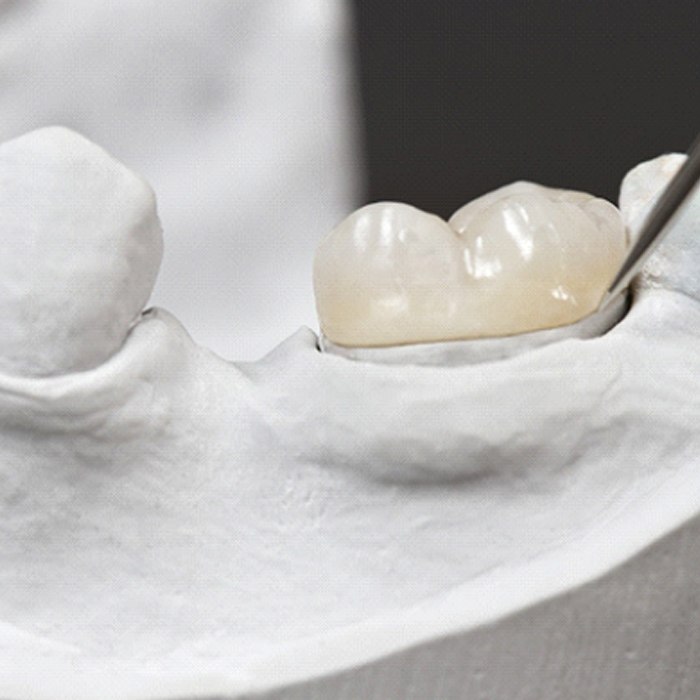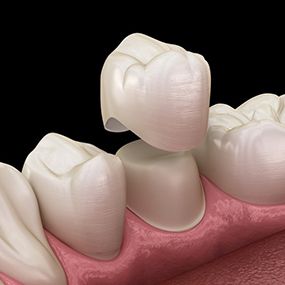When fractures, chips, cracks, and increasing decay are left untreated, an infection can set in and lead to increasing oral health problems. At Dental Wellness of Lexington, Dr. Feck, Dr. Combs, and Dr. Wilson are all equipped to protect and restore your smile with the use of a dental crown in Lexington. These small, custom-made prosthetics are designed to cover your weakened tooth and offer lasting protection. This tried and true restorative solution has given patients a reason to smile for decades, so if you’re ready to do something about your problem tooth, give us a call to and let us schedule your appointment.
Dental Crowns – Lexington, KY
Restoring Smiles with Added Protection

Why Choose Dental Wellness of Lexington for Dental Crowns?
- Personalized treatment to address your individual needs
- Sedation dentistry to make your procedure more comfortable
- Custom-made dental restoration to match your smile
What Are Dental Crowns?

A dental crown is also known as a dental cap in Lexington. Covering an individual tooth that is weakened due to injury or decay, it helps to rebuild the tooth’s lost structure as well as restore its natural function.
The reasons you might need a dental crown include:
- Severe dental injury
- Decay that cannot be treated with a filling
- A tooth that has undergone multiple procedures and is now breaking
- Weakened tooth due to bruxism
- Cosmetic imperfections (i.e. stains, chips, cracks)
Am I a Good Candidate for a Dental Crown?

The only way to find out if you are a good candidate for dental crowns is to allow your dentist in Lexington to examine your smile. Once they have evaluated the tooth, they can make a determination as to whether a crown will produce successful results.
Should you have a tooth that exhibits any of the following, it is likely Dr. Feck, Dr. Combs, or Dr. Wilson will suggest a dental crown:
- A large filling has damaged your tooth
- Severe decay that a filling cannot fix
- Injured tooth
- A weakened tooth that requires protection
- A tooth that’s previously had a root canal
- A dental implant that is in need of a dental crown
- Replacing an old amalgam filling
What is the Procedure Like?

In order to receive a dental crown, the process typically takes two visits to our office. During your first visit, your dentist will begin by removing the damaged portion of your natural tooth, cleaning it out and filling it with composite resin. This will seal the tooth and prevent further reinfection or damage. Before leaving, we will file down the tooth to make sure your final restoration properly fits over your natural tooth. We’ll place a temporary for you to wear until your permanent crown is ready.
Once you return for your second and final appointment, we will remove the temporary and cement your permanent crown into place. This should create a strong seal that offers added protection and encourages your natural tooth to stay intact and rebuild its structure.
What Are the Benefits of Dental Crowns?

For decades or longer, dental crowns have been used by dentists all over the world to restore and rebuild smiles. Their outstanding benefits are what continue to make them a popular restorative option. Some of these benefits include:
- Improved confidence and appearance
- Greater protection for a weakened tooth
- Durability
- Allows your natural tooth to remain intact
- Easy to maintain
- Long-lasting
Dental Crown FAQs
 Prior to undergoing any kind of dental procedure, it’s important to be as well-informed as you can about your treatment. Here at Dental Wellness of Lexington, we’ve used dental crowns to restore the function and beauty of countless smiles. In the section below, you’ll find the answers to many frequently asked dental crown questions. If you still have a question, though, feel free to reach out to us!
Prior to undergoing any kind of dental procedure, it’s important to be as well-informed as you can about your treatment. Here at Dental Wellness of Lexington, we’ve used dental crowns to restore the function and beauty of countless smiles. In the section below, you’ll find the answers to many frequently asked dental crown questions. If you still have a question, though, feel free to reach out to us!
What’s the Difference Between Dental Crowns and Veneers?
Veneers and dental crowns are both treatments that often toe the line between restorative and cosmetic dentistry. They both involve removing some enamel to prepare your tooth. The main difference is that veneers only conceal the front-facing surface of the tooth. Therefore, they don’t protect against future decay and damage as effectively as crowns do. Because crowns cover the entire portion of the tooth that is above the gumline, they’re better at sealing out bacteria and keeping your tooth healthier in the long run.
How Long Do Dental Crowns Last?
In most cases, dental crowns are durable enough to last 10-15 years before they must be replaced. However, the lifespan of your crown will depend on several factors, such as your commitment to oral hygiene, your diet, and whether you clench or grind your teeth.
How Do I Take Care of My Crown?
Here are some easy tips for keeping your crown is excellent condition:
- Thoroughly brush and floss every day to prevent bacteria from getting underneath the crown and creating cavities in the natural tooth.
- See us for regular checkups. That way, if a cavity or some other problem does develop, we can catch and treat it early.
- Wear a nightguard if you suffer from bruxism (nighttime teeth grinding or jaw clenching). Not doing so can chip or crack your crown as well as your natural teeth.
- Wear a mouthguard if you play sports to protect your crown from injury.
- Avoid chewing on anything particularly hard, such as ice, fingernails, pens, or hard candy.
- Limit your consumption of sugary items to decrease your risk of getting cavities.
What Are Dental Crowns Made Of?
In the past, crowns were typically made of gold or various other metals. While you could still cover a back tooth with a metal crown, we typically use a more cosmetically pleasing material for crowns placed in the front of the mouth. These crowns are usually made of dental porcelain, ceramic, or zirconia. Not only are these materials as durable and long-lasting as metal, they resemble natural tooth enamel almost perfectly. They even reflect light in the exact same way!
Each crown will be custom-made to mimic the size, shape, color, and proportion of your adjacent teeth. Thanks to these natural-looking materials, no one outside of our dental team should even be able to tell that you had dental work done!
